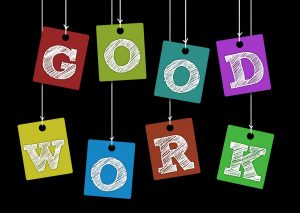
My last post offered four tips on exploring your career fit: inventorying your activities, assessing your likes and dislikes, dissecting your list, and looking for patterns. There’s another similar exercise that can help you come to a reasonably good understanding of how good you are – or were – at the various activities you listed in the previous brainstorming.
It can be hard to remain objective when evaluating how good you are at things, but I think you’ll note that this exercise takes that premise into account.
So, go back to the list you filled out from my prior post – or go back and do that first if you haven’t. Now, do two things when you look at each category or item. First, give yourself a skill rating (1 to 10, with 10 being the highest) that exemplifies how well you think you did that task. Second, ask yourself, “What did I accomplish?”
This is important. No matter how good you think you are at any one activity, please keep a mindset of having objective criteria that can confirm your perceptions. How many widgets did you sell compared to others, for example? What was your part in developing that software? How well did the team you managed actually do, relative to the talent in the scenario? It’s not a contest or test; just be honest with yourself. If you didn’t accomplish anything, let it go. If you did, take the credit!
The gist is to be cognizant in this part of the exercise of any discrepancies between the “how-good-am-I-at-this” rating you give yourself and the specific accomplishments you are able to catalog. If you’ve given yourself a high rank but aren’t able to identify any accomplishments, you may want to revisit your rating. Conversely, if you gave yourself a low rating on a specific item and yet are able to write down multiple accomplishments, you should consider whether you’re underrating yourself. You’re likely more skilled than you give yourself credit for. It will serve you well to take enough time with this. If you do, you should have an overview of what you’re good at and that you like.
Tighten your focal point.
Now, it’s time to focus on the specific features that the various jobs you might consider are likely to offer you. The following is a list of “what-I’m-looking-for-in-a-job” statements. Go through and check as follows:
- If the feature is very important to you, write VI.
- If the feature is important to you, write I.
- If the feature is unimportant, write U.
- If for some reason, the feature is absolutely offensive to you, write O.
Financial rewards and compensation warm fuzzies:
- A salary that will enable you to measurably improve your current lifestyle _____.
- Generous benefit package and lots of perks (expense account, trips, tuition reimbursement, car, etc.) _____.
- The potential for great earning power in the future _____.
- The potential to make a lot of money in a short timeframe _____.
Personal job and career fulfillment factors:
- The potential to spend the majority of your time doing the things you were trained for and like doing _____.
- A break to do things you’ve never done before _____.
- A chance to work independently without supervision _____.
- An opportunity to work with technology that excites you _____.
- A chance to learn a new skill or hone other skills, opening doors for opportunities _____.
- An opportunity to cement your footprint in a career that promises fairly rapid and steady progression _____.
Lifestyle fulfillment factors:
- A location that doesn’t require a long commute _____.
- A situation that doesn’t require extensive travel out of alignment with your lifestyle _____.
- A flexible schedule that will allow you to stay in control of your personal life (childcare, community service, etc.) _____.
Employer company or organization:
- An opportunity to join a prestigious or large company / organization with room for advancement _____.
- A chance to be part of a startup, entrepreneurial or small company with innovation and exciting ideas top of mind _____.
- A chance to work for an organization that offers a product or service that makes the world a better place _____.
- An opportunity to work for an organization or company with a product or service that personally interests you. ____.
Workplace environment and people:
- An empowering, supportive atmosphere where people take care of each other _____.
- An invigorating, social working environment where team collaboration is valued _____.
- A low-pressure, predictable workplace that allows you to leave your job at the office and not have to carry it with you after hours _____.
- A challenging pressured workplace where you’re always stretching yourself to think and stay on top _____.
- A chance to work for or interface with dynamic folks from whom you feel you can learn _____.
- An opportunity to be outside a great deal of the time, rather than inside _____.
When done with the list, tally those features you rated VI (very important). These should rank highly as you begin framing job targets. So, if you find, for example, that most of your VIs are in the area of job and career fulfillment, those factors should play an important part in the job targets you choose. Don’t forget to analyze the Os (offensives), as they will help you rule out those areas that are going to clearly make you an unhappy camper.
There is of course, no magic; nor is it a scientific formula. The exercise can, however, help you with some added insight into yourself. By all means, modify the process or add to the list, as many considerations as you wish. I’d love to hear your ideas for other areas that could be included!

